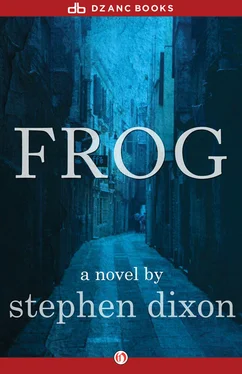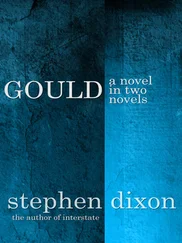Stephen Dixon - Frog
Здесь есть возможность читать онлайн «Stephen Dixon - Frog» весь текст электронной книги совершенно бесплатно (целиком полную версию без сокращений). В некоторых случаях можно слушать аудио, скачать через торрент в формате fb2 и присутствует краткое содержание. Год выпуска: 2013, Издательство: Dzanc Books, Жанр: Современная проза, на английском языке. Описание произведения, (предисловие) а так же отзывы посетителей доступны на портале библиотеки ЛибКат.
- Название:Frog
- Автор:
- Издательство:Dzanc Books
- Жанр:
- Год:2013
- ISBN:нет данных
- Рейтинг книги:5 / 5. Голосов: 1
-
Избранное:Добавить в избранное
- Отзывы:
-
Ваша оценка:
- 100
- 1
- 2
- 3
- 4
- 5
Frog: краткое содержание, описание и аннотация
Предлагаем к чтению аннотацию, описание, краткое содержание или предисловие (зависит от того, что написал сам автор книги «Frog»). Если вы не нашли необходимую информацию о книге — напишите в комментариях, мы постараемся отыскать её.
Frog — читать онлайн бесплатно полную книгу (весь текст) целиком
Ниже представлен текст книги, разбитый по страницам. Система сохранения места последней прочитанной страницы, позволяет с удобством читать онлайн бесплатно книгу «Frog», без необходимости каждый раз заново искать на чём Вы остановились. Поставьте закладку, и сможете в любой момент перейти на страницу, на которой закончили чтение.
Интервал:
Закладка:
17. Frog’s Interview
I wrote a letter suggesting an interview with him. He wrote back “I’ve been interviewed twice in the last three years and the day after each interview I told the interviewers to erase the tapes and tear up their notes. I’m not articulate or glib or confident enough for one. I also ramble on too much and have little to say about my life and work and the practice of fiction writing. So, wouldn’t want to waste your time, but thanks.”
I wrote back saying I’d still like interviewing him and gave him several pages of possible questions. “Just write your responses to them. Say anything you want. Let loose and be provocative if need be. It probably was the tape recorder and presence of the interviewer that ruined your last interviews. Since you have been a writer for so long, maybe this is the most natural way for you to be interviewed.”
He wrote back “I don’t like to be interviewed any old way and I don’t like to read these interviews either. I’m not interested in why writers write or what they have to say other than what I get from their fiction. I’m not interested in just about any nonfiction other than some major poetry and a few readable plays, and also an occasional newspaper article, and that mostly to read with my coffee to start the day and maybe to sit on the toilet with. Listen, I don’t want people knowing where I came from, who my parents are, the effects of being the youngest of seventeen children and the only boy in the family, my wives and kids, my dogs and cats, the two gorillas I had as pets till they tore the mail satchel off our postman’s shoulder, the various jobs I’ve had and continents I’ve lived on, my prison terms, why one leg’s a foot and a half shorter than the other, all the hand-me-down girls’ clothes … but you’ve got it. How my life leaks into my fiction and vice versa and what comes from the real and what from the imagination and what kind of instrument I use to sharpen my typewriters every morning, and so on. I also can’t answer your questions in writing because I’m a writer who only writes fiction. Whose only nonfiction, in fact, since I was a pimp maybe 25 years ago, was an article called ‘Why a Pimp Can’t Write Nonfiction.’ And I only wrote that out of spite because the university quarterly that was devoting half an issue to my work plus a complete bibliography, wouldn’t pay me a cent for the stories it was also publishing in the issue but would give me $200 for a 500-word article. Besides, no understanding of me or my… but enough. I’m easily confused, distracted and tormented and almost nothing does this quicker to me than an interview or prospect of one. So, thanks again for asking.”
I wrote back saying “I tried, it didn’t work, I respect your reasons for not wanting an interview. But now I’ve something different to ask of you. The letter with all those interview questions was written on a word processor, and before I could save the letter an electric storm wiped it out. I didn’t mention it before because I thought you might think I’d be too incompetent to interview you. If you still have the letter, could you please make a copy of it and send it to me? It took two days to compose those questions — it was, quite frankly, one of the most tedious chores I’ve done and I’d hate to repeat it — and I’d like to use them on another writer I’ve lined up to interview.”
He wrote back “Listen, I’m a lousy interviewee — how many times must I say it? Interviews make my head ache, stomach sick, nose bleed, and later I’m mean to my family, I knock down clothes in closets, I put washed dishes in the cupboard before they’re dry, I punch walls and then can’t type for days, I begin seeing myself as an imposter as a teacher and an impersonator as a thinker and a masquerader as a writer. I believe that fiction writers…”
I wrote back “OK, the truth, which I was too embarrassed to tell before. Maybe you didn’t notice — my embarrassment was that you’d think I sent them intentionally, so I could squeeze a comment out of you, which isn’t it at all — but what was also on the last page of that letter of interview questions I sent you were two first drafts of poems I wrote. I composed them on a word processor, forgot to tear them off the bottom of the letter, and only after the storm wiped out the letter and I had canvassed the house for my poems did I realize what must have happened to them and where they might be. I’ve tried recalling them from memory but all I can remember is that they were two of the best first drafts I’ve ever written. Please, if you have that letter, send the poems to me? Tear off and throw away the interview questions, even if that is the only copy there is of them — compared to the poems, I don’t care about them anymore.”
I called him from Paris several weeks later — heck with the expense. Those poems had definite possibilities and it was killing me that they were lost. His wife answered, I told her why I was calling, and she said it would be futile to try and get him to the phone. “Tell him it’s not for the interview anymore,” I said. “If he’s an artist — a serious writer — whatever he is — just a decent person-excuse me, but you know what I mean — surely he’ll understand why I want my poems back.” “He’s in his room working on the first draft of a new story. It’s the only time he gives me express orders not to disturb him for anything, except if one of the children suddenly gets violently sick or hurt or there’s a fire or something, and even that depends on the size of the blaze. If I think I can put it out without him, he’s said, then leave him be till I hear him stop typing. For you see, two to three hours of agonizing first-draft work gives him two to three months of pleasurable rewriting till the story’s completed, and as a result of it, general well-being for the house and all its occupants during that time.” “Tell him I’ll be in the States and passing through Baltimore in two weeks. If he’s found my letter by then, would he save it for me? And if he hasn’t, would he let me look for it where he might have left it?” “I’m sure he would,” she said, “so long as you don’t touch anything on his desk without his permission.”
I was in Baltimore two weeks later and called. He answered the phone and I said “Please, I don’t want to waste your time further, but did you find my letter?” “I found, I found,” he said, “so what’s the big fuss?” “The big fuss, sir, are those two poems of mine. As for the questions in the letter, I could still use some of them for an interview I’m doing in Washington tomorrow with Rodney Stein.” “Oh, big man, Stein — you’re interviewing the right guy, and you’ll get nothing but cooperation from him. He has a big book coming out, from a big publisher and with big publicity money behind it, so an interview or two will get his name around and help the book sell and maybe jack up the paperback sale price and get it to one of the big clubs, which should eventually interest all the chains to stock it. Believe me, if you want to be a serious writer today who makes a decent living from his books and also get lots of awards, you have to be interviewed in the right places from time to time, if you can’t capitalize on your reclusiveness and indifference to interviews. So what am I saying? Nothing. I’m rambling. Be glad I didn’t grant you that interview.”
“My letter, sir. Could I come by now? I’ll only be a minute.” “Sure, come, pick it up, make my desk just a little less cluttered, but leave your tape recorder in the train station locker or wherever you are.” “I wouldn’t think of interviewing you, sir. I know how you feel.”
I cabbed over. He was waiting outside for me, waving my letter. He gave me it, introduced his family, invited me in for coffee and cake. It was a small, modest house. Outside: a tiny yard, one tall tree, lots of dead patches of grass, some flowers, bushes, redwood table and cheap chairs, a swing set. Inside: not much furniture and most of it damaged and old, lots of kid stuff on the tables and floors, in the dining room a large cardboard playhouse with piles of children’s books and two small rocking chairs in it, long high bookcases running the entire length, except for the windows, of three living room walls.
Читать дальшеИнтервал:
Закладка:
Похожие книги на «Frog»
Представляем Вашему вниманию похожие книги на «Frog» списком для выбора. Мы отобрали схожую по названию и смыслу литературу в надежде предоставить читателям больше вариантов отыскать новые, интересные, ещё непрочитанные произведения.
Обсуждение, отзывы о книге «Frog» и просто собственные мнения читателей. Оставьте ваши комментарии, напишите, что Вы думаете о произведении, его смысле или главных героях. Укажите что конкретно понравилось, а что нет, и почему Вы так считаете.












